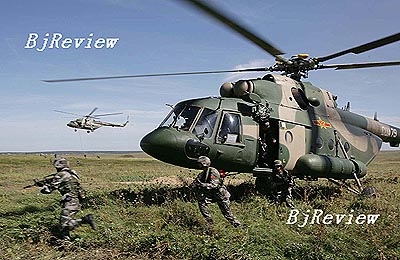
In mid-August, the SCO held its seventh summit in Bishkek, Kyrgyzstan, the largest meeting since the SCO's founding. The leaders of the SCO's member states-China, Kazakhstan, Kyrgyzstan, Russia, Tajikistan and Uzbekistan-attended along with representatives from the four observer countries, Mongolia, Pakistan, Iran and India. Afghan President Hamid Karzai, Turkmen President Gurbanguly Berdymukhamedov and United Nations Undersecretary General B. Lynn Pascoe also were present.
During the summit, the SCO member countries signed a treaty on long-term friendship and cooperation, strengthening their mutual political trust and good neighborliness. The treaty laid the political and legal foundations for the region's long-term peace and common development. The leaders also signed the Bishkek Declaration setting the SCO's future path and issued a joint communiqué detailing the organization's work agenda.
Top SCO leaders signed a milestone declaration on multilateralism, strategic stability, information security, Central Asian security and stability and energy cooperation. The decree also set a new goal for a modern international security system through multilateral cooperation under UN leadership. This system will rely on each country's own strength, maintain national integrity and respect different civilizations.
In the declaration, SCO leaders proposed suggestions for the organization's construction. Chinese President Hu Jintao urged all member states "to take advantage of their geographical vicinity and economic compatibility to tap their own potential and achieve common development." The SCO also should improve the legal structure of all member states for further cooperation, speed up the distribution of regulations on road transport facilitation and multilateral treaties to encourage and protect mutual investments, implement guidelines on multilateral economic cooperation, and conduct projects in the energy, transportation and telecom sectors, Hu said.
"The treaty will confirm the SCO spirits of pursuing peace and friendship from generation to generation in the form of a legal document, which is of great significance to mutual trust and mutually beneficial cooperation in Central Asia," said Chinese Assistant Foreign Minister Li Hui at a press briefing.
During the summit, the leaders also agreed in a communiqué to further develop all-around cooperation within the SCO and exchange more in-depth views on current regional and international issues, such as antiterrorism, regional stability, economic cooperation and international exchange. They made the following points:
. Antiterrorism: With cooperation among legislative bodies and supreme courts becoming more important, SCO member states should actively exchange legislative information. They should increase efforts to prevent the financing of terrorist activities and money laundering. It is extremely important to implement the SCO's cooperation deal on combating terrorism, separatism and extremism between now and 2009, the communiqué said.
. Regional stability: SCO leaders stressed an urgent need to put in place precautionary measures and mechanisms to deal with threats against regional peace, security and stability. They agreed to undertake more extensive efforts to crack down on illegal immigration, drug trafficking and terrorism.
. Economic cooperation: The SCO's economic cooperation is being implemented well in energy, transportation and telecommunications projects, the joint communiqué said. The business and banking committees should play a more significant role. SCO members stressed the importance of cooperating on energy issues. They also said they were concerned about environmental protection and the reasonable use of natural resources.
. International exchange: The leaders said that the SCO's international exchanges with other countries and organizations, such as the Commonwealth of Independent States, the Eurasian Economic Community, and the Association of Southeast Asian Nations, are worthwhile, and that they should strengthen further cooperation with SCO observers in various fields.
The eighth SCO summit meeting will be held in Dushanbe, Tajikistan, which will hold the rotating presidency next year. The ninth SCO summit meeting will be held in 2009 in Yekaterinburg, Russia, the joint communiqué said.
Six years after its founding, the Shanghai Cooperation Organization (SCO) continues to be at the forefront of regional cooperation initiatives, especially antiterrorism activities.
The six SCO member countries and four observer nations comprise an area of more than 30 million square km, or three fifths of Eurasia. They have a collective population of almost 1.5 billion, a quarter of the world's total.
Formed on June 15, 2001, the SCO covers a wide range of fields including security, economy, transportation, culture, disaster relief, law enforcement and economic cooperation. The organization not only promotes security, stability and peaceful development in the region, but also influences international ties between member countries.
Hu in Central Asia
Beside the SCO summit, Chinese President Hu Jintao toured Central Asia, making state visits to Kyrgyzstan and Kazakhstan, and observing the antiterror drill in Russia.
During his first-ever visit to Kyrgyzstan, Hu and Kyrgyz President Kurmanbek Bakiyev laid out a blueprint for the development of future bilateral ties. Both agreed to build up and deepen their overall exchanges and cooperation in politics, economic issues, trade, transportation, energy and the humanities and to battle terrorism, separatism and extremism.
| 